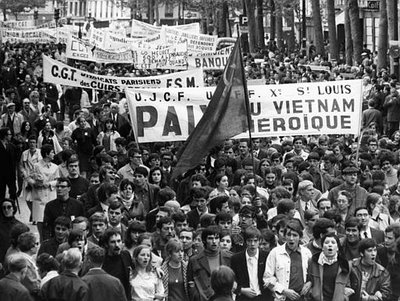Your social movement is growing tiresome
 If you listen to people who study social movements there is little doubt about where protesters stand in relation to existing institutions:
If you listen to people who study social movements there is little doubt about where protesters stand in relation to existing institutions:
In fact, they all agree. Social movements are not institutionalized. Indeed, that's precisely why regular people use them:"...contentious politics organizes on the boundaries of institutions and is never truly accepted by institutional elites." (Tarrow 1998: 67)
Study after study shows social movements at their most powerful when they disrupt the daily routines of institutions, and it is when they lose their disruptive edge that they run the risk of being "absorbed and institutionalized into ordinary politics" (Tarrow 1998: 9). This is when they start acting more like an interest group, a lobby, or a political party.*Collective action becomes contentious when it is used by people who lack regular access to institutions...Contentious collective action is the basis of social movements...because it is the main and often the only recourse that ordinary people possess against better-equipped opponents or powerful states." (Tarrow 1998: 3)
The paradox of social movements then lies in their remarkable persistence. This purportedly non-institutionalized form has hardly changed in roughly 200 years. When 19th century campaigners for parliamentary reform hit the streets they did pretty much the same things that 21st century immigration activists do: picket, demonstrate, march, boycott, petition, strike, form organizations, solicit media attention. Certainly these organized campaigns seek to influence existing institutions, but why stick with such (dare I say) antiquated techniques? Put differently, why is there "such startling homgeneity of organizational forms and practices" (DiMaggio & Powell 1991: 64)?
* It must be said that social movement scholars are guilty of a longstanding bias favoring movements oriented toward politics and the state. So when they talk about institutions they really mean the polity, and in that context social movements most certainly are marginal actors.
Labels: social movements, sociology
October 17, 2006 9:05 PM
I learned more about pure social movements literature in that blog post than I have thus far in grad school
October 22, 2006 2:17 PM
I wish you would have been standing next to me at the bus stop the other night when I got off work as I stood and watched three youngsters holding a McMurder banner on the street corner across the block. I relived ten years of my life in that 15 minutes waiting for the bus. I wanted to go over and talk the activists, explain to them that yes I indeed did just look like another drone who just walked out of an insurance tower after working 8 hours but in reality was a vegan who quite possibly held more radical views then them. Instead I just watched and observed the reactions of passers by. That's it, I'm getting a cell phone so I can call you at moments like that.